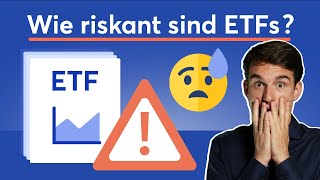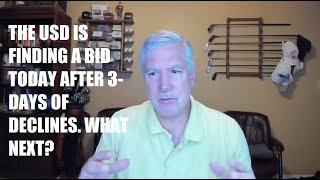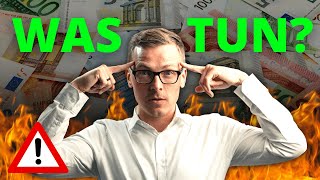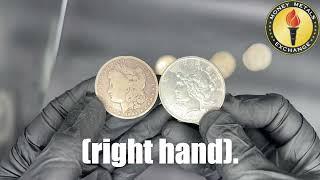Tag Archive: newsletter
Do THIS to Survive the Next Depression – Robert Kiyosaki, Franco Lofranco, Christina Ann Sweney
Robert Kiyosaki believes that the number one predictor of the success of an entrepreneur is his or her ability to sell. It’s not just the ability to sell a product, which is very important, but also about the ability to sell a vision, a team, yourself, and potential partners and deals.
Read More »
Read More »
Der Kampf um die Freiheit ist der Kampf um die Sprache | Max Otte bei Matthias Burchardt
In George Orwells berühmtem Roman „1984“ wird die Sprache durch ein totalitäres Regime zum grotesken „Neusprech“ umgebogen. Ähnlichkeiten zur heutigen „politischen Korrektheit“ sind nicht zu übersehen. Der Weg, das Denken durch Sprache zu kontrollieren und dadurch Menschen zu beherrschen, ist heute im Mainstream angekommen. Das Individuum soll dabei ausgeschaltet werden.
Im Gespräch mit dem Geisteswissenschaftler Dr. Matthias #Burchardt erklärte...
Read More »
Read More »
Andreas Beck: Dann kommt die Jahresendrally! + Update zu Inflation & Fed
Kommt jetzt die Jahresendrally? Im exklusiven Interview erklärt Portfolio-Experte Dr. Andreas Beck, was passieren muss, damit die Kurse bis Ende Dezember nochmal richtig anziehen. Der Mathematiker verrät zudem, welchen Zinsschritt er erwartet beim nächsten Meeting der amerikanischen Notenbank Fed im Dezember. Ich habe habe mit Andreas auch über die aktuelle Zusammensetzung seines Global Portfolio One (GPO) gesprochen – was er am Konzept gerade...
Read More »
Read More »
Ray Dalio: Damit rechnet niemand!
Es kann einem schon etwas mulmig werden, denn Ray Dalio spricht ganz offen über die Möglichkeit, einen großen, internationalen Konfliktes und zwar militärisch ausgetragen. Das Ganze nennt man dann Krieg. Auf der anderen Seite zeichnet er aber auch ein Szenario, welches vollkommen anders aussieht.
Read More »
Read More »
ETF Risiken: Wie sicher sind ETFs? 3 Risiko-Kennzahlen!
Heute erfahrt ihr alles was ihr zu Risikokennzahlen wissen müsst. Außerdem zeigen wir euch noch, wie ihr mit unserer ETF-Suche mehrere ETFs und ihre Risikokennzahlen vergleichen könnt. Viel Spaß!
Read More »
Read More »
COP27: who should pay for a warming planet?
Campaigners who believe world leaders are not doing enough to combat climate change are taking matters into their own hands—and suing governments and fossil-fuel companies. But can the climate catastrophe really be resolved in court?
00:00 - A rapidly warming world
01:25 - Climate effects in Peru
03:54 - Climate adaptation funding
05:17 - Peru farmer v RWE
08:36 - Rise in climate litigation cases
09:49 - Landmark win for the Torres Strait Islands...
Read More »
Read More »
Do you have a Problem in Life? Gedanken zu einem Vortrag von Gaur Gopal Prabhu – Reupload 12/2017
✘ Werbung:
Mein Buch Allgemeinbildung ► https://amazon.de/dp/B09RFZH4W1/
Gaur Gopal Prabhu, ein hinduistischer indischer Priester teilt seine Lebensweisheiten mit den Menschen. Ein Gedanke von ihm über die Probleme des Lebens hat mich schwer beeindruckt. Er drückt ihn in wenigen Sätzen aus. Ich brauche dazu etwas länger ;-)
Original Vortrag ►
TEDxMITP ►
Read More »
Read More »
NZDUSD bounces near 100 hour MA/broken 38.2% retracement. What now?
The NZDUSD has bounced off a target support level after correcting lower from a key resistance level during trading yesterday.
The buyers and sellers are lining up against the target support and resistance levels with the buyers trying to keep technical control.
Read More »
Read More »
Enthüllung! Christian Lindner offenbart Unfassbares!
Wie wird sich die aktuell kritische Lage weiter entwickeln?
Wir schauen uns regelmäßig an, was Experten wie Ernst Wollf, Dr. Markus Krall, Prof. Hans-Werner Sinn, Dirk Müller, Max Otte oder Marc Friedrich zur aktuellen Lage sagen.
Read More »
Read More »
US REGIERUNG FORDERT FRIEDENSGESPRÄCHE! KIEW UND MOSKAU BALD EINS!
Wirtschaft aktuell: Was passiert jetzt? Jetzt ein Demokonto eröffnen & in Sachwerte kaufen? Negativzinsen durch ein Online Bankkonto umgehen? Macht Forex Trading, CFD Handel und Aktien oder der sichere Hafen Girokonto und Gold Sinn?
Read More »
Read More »
Will We Get Gridlock? | 3:00 on Markets & Money
(11/9/22) Midterm elections are behind us, and all that's left to determine is who will control the House and the Senate, and will we get a gridlocked congress, which tends to be better for markets. Historically, post-midterm election markets tend to rally into the year-end. Meanwhile, the bottoms built in September and October have resulted in a rally, albeit not a strong one. The buy-signal on the MACD has performed as expected. Stocks yesterday...
Read More »
Read More »
The USD moves higher after 3 days of declines. Technical levels did help reverse the bias.What next?
Greg Michalowski of Forexlive takes a technical look at the EURUSD, USDJPY, GBPUSD and AUDUSD to start your trading day in the US.
The USD moved lower for 3 consecutive days (the US stocks moved higher as a result). That move is seeing some retracement today. Technical targets were reached in a number of currency pairs to help the reversal. The move back higher in the USD is taking back some bearish technical breaks.
EURUSD: The EURUSD is moving...
Read More »
Read More »
Wann kommt der Lastenausgleich und wie kannst du dich schützen? // Interview mit Christoph Heuermann
Im heutigen Interview mit Christoph Heuermann geht es darum, wann der Lastenausgleich kommen könnte, wen es treffen könnte und wie ihr euch davor schützen könnt.
Zum den spannenden Angeboten von Christoph Heuermann:
Videokurs (Staatenlos Geheimwissen): https://go.investorenausbildung.de/3NUl4Ws
Persönliche Beratung: https://go.investorenausbildung.de/3DU3Q6F
Messenger Beratung: https://go.investorenausbildung.de/3DVVWK4
Erfahre in diesem...
Read More »
Read More »
Andreas Beck: Keine Angst in der Krise | #etpthemenwoche | Geldanlage | Inflation
? Exklusive Infos direkt vom Parkett:
► Abonniere kostenlos unsere Börsen-Newsletter: https://www.boerse-stuttgart.de/de-de/service/newsletter/newsletter/
► Darum geht's im Video: Turbulente Zeiten an den Finanzmärkten - die Inflationsrate von über 10 Prozent knabbert am Ersparten, die Aktienkurse befinden sich auf Talfahrt. Und jetzt? Wie Anleger mit ihrem Depot durch die Krise kommen, Einzeltitel oder ETFs? und welche Rolle Anleihen spielen...
Read More »
Read More »
Nach den Zwischenwahlen in Amerika – Wie geht es an den Finanzmärkten weiter?
Was in den USA passiert, hat weltweite Auswirkungen. Und so werden auch die Ergebnisse der Zwischenwahlen zu spüren sein. Welche (wirtschafts-)politische Richtung schlägt Amerika ein? Welche Entwicklungen zeichnen sich im Verhältnis zu China, vor allem aber zur EU ab? Und nicht zuletzt, welche Trends sind an den Börsen zu erwarten? Robert Halver mit ersten Einschätzungen
Read More »
Read More »
Dirk Müller auf dem Anlegerkongress 2022 – “Kampf der Titanen – zweite Runde!” – 2. Teil
????? ??? ??? ?. ???? ??? ????????? ????::
(Bei diesem Video handelt es sich um den 2. Teil des Vortrags von Dirk Müller auf dem Anlegerkongress - Digital 2022 der Dirk Müller Premium Aktien Fonds.)
Read More »
Read More »
How to Lose a Billion Dollars in Crypto
(11/9/22) The election is past; time to move on: Why Markets can now be optimistic. Stocks tend to perform well in the 12-months following a midterm election. With stock buybacks, Thanksgiving, and end of year maneuvering, markets will see uptick in activity., but it's going to be sloppy. Disney streaming disappoints: Too much competition, not enough good content. The Crypto-crash of FTX; Sam Bankman-Fried fries his fortune, losing 94% of net...
Read More »
Read More »
+10% ADIDAS – Rettet ein Stop-Loss Dein Kapital wirklich? | Mario Lüddemann
Als Trader stehen wir oft vor der Frage, ob wir besser mit Stopps arbeiten sollten oder nicht. Es gibt sowohl dafür als auch dagegen viele gute Argumente. Warum Dir aber der Stopp am Ende Dein Vermögen retten kann und warum Du für diese Sicherheit auf ein Wenig Deiner Performance verzichten solltest, verrate ich Dir in meinem heutigen Video.
► Jetzt Termin vereinbaren und vom Experten beraten lassen!
https://mariolueddemann.com/trading-beratung/...
Read More »
Read More »
SCHLIMMSTE FINANZKRISE SEIT 2. WELTKRIEG!
Wirtschaft aktuell: Was passiert jetzt? Jetzt ein Demokonto eröffnen & in Sachwerte kaufen? Negativzinsen durch ein Online Bankkonto umgehen? Macht Forex Trading, CFD Handel und Aktien oder der sichere Hafen Girokonto und Gold Sinn?
Read More »
Read More »





























































